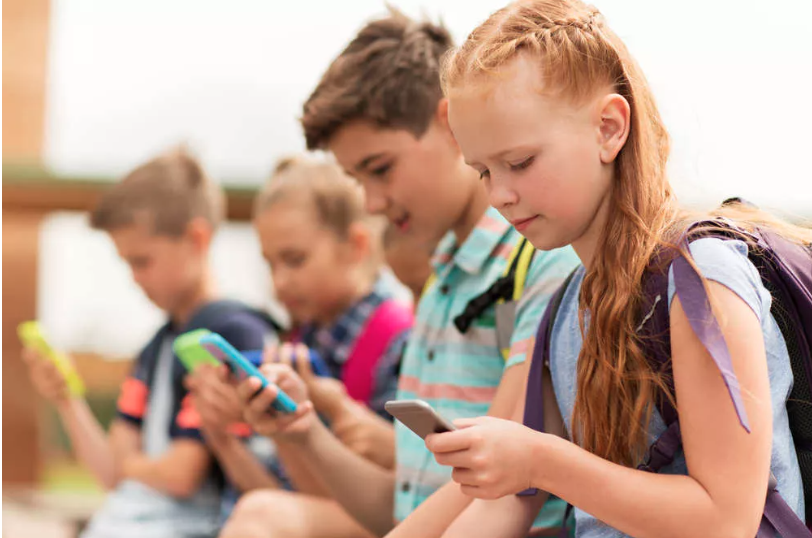Parents absorbed in screens in front of their children: beware, it limits their emotional development
What dad or mom never looks at their cell phone in front of their children? Which of us parents, when playing or conversing with them, always maintains complete concentration towards them, without being distracted by screens?
Obviously, no one. If there is anyone who succeeds in such a feat, that is, manages to establish a clear and insurmountable boundary between the time they spend with their children and the time they use their smartphones, then they really have a lot to teach us mere mortals.
It is inevitable in the age of digital and hyper-connectedness that digital tools exert significant pressure on us and therefore “call” us even when we are with the little ones.
How many of us, however, know that spending a lot of time on our cell phones in the presence of our children damages their emotional development?
Children and screens
We have dwelt many times on the damage that their excessive exposure to tablets, TVs and cell phones in preschool and beyond can have on children’s development. Experts call these tools “digital pacifiers.” Parents use them, in fact, to quell crying or as babysitters to be exploited in order to do something else. Yet, there are truly many problems associated with abuse of these tools.
One aspect, however, that one might not think about is that even using technology too frequently in front of children, such that it limits attention to and communication with them, can impair both our relationship with the little ones and their emotional development.
Becoming aware of one’s limitations and mistakes is the first step
I would like to point out that as a mother I feel I have to make a resounding mea culpa. When messages come to me, I often struggle to delay reading and responding to them, thus earning righteous reprimands from my children because we may be doing something together at that moment.
Well yes, I’m also there – although I don’t want to be – among the moms who hear from their children, “Mom, no more phone!” or “Don’t look there, have you seen my drawing?”
It’s good that we as parents become aware that letting ourselves be absorbed by screens harms us, who miss the opportunity to watch our children grow, and harms them, who feel put on the back burner in favor of the content scrolling on our cell phones.
The study
According to a University of California study frequent cell phone use near your child limits interactions and has negative developmental effects. It is not enough to disallow, or allow little, acess to the smartphone for your children. Robin Nabi, professor of communication at the University of California, showed that frequently looking at a cell phone in front of one’s children could have a negative impact on the development of their emotional intelligence or “those mental skills that enable a person to recognize, understand, and manage their own emotional states and those of others.”
Expert warns, “For a child, a caregiver looking absorbed in the screen is distant.”
What has been said so far certainly does not apply only to parents, but to anyone in charge of the child (grandparents, uncles, babysitters): the smartphone or tablet becomes a barrier with respect to the little ones’ demands and need for attention. “People are born with a certain level of emotional intelligence that varies from individual to individual but that throughout life, but especially in childhood, is a gift that can be developed,” explains Nabi. “There are people who have, by nature, a greater sensitivity in grasping emotional nuances, others less so, but everyone can improve their level of emotional intelligence, which has relevant impacts on everyday life, because it means being able to better manage one’s own emotions, even anxiety and anger, and understand those of others. The constant use of the cell phone in front of the daughter or son limits the growth of these emotional skills, regardless of the type of content a parent may display on their phone, because “what the child sees,” Nabi points out, “is a lack of responsiveness, an expressionless face. It is important, then, for “parents to be more aware of how often they use their phones in front of their children and to keep in mind that children value as a priority what their parents watch.”
How the research data were collected
The work conducted by Professor Nabi involved 400 parents of children between 5 to 12 years of age. Several assessments were conducted, in which parents measured their children’s level of emotional awareness, their capacity for self-control and their degree of concern for others. Among the questions asked in the questionnaire distributed to the families were also asked what media were routinely used at home and how often they engaged in other activities such as reading, listening to music and playing games. The data collected showed that the only variable associated with lower emotional intelligence of the child was when parents used cell phones in the presence of their children.
Alcune regole di buonsenso
Se portare a zero il consumo tecnologico davanti ai nostri figli è pressoché impossibile, l’esperta spiega che è importante impostare delle regole chiare. Una tra tante? Niente telefoni durante il pranzo o la cena, condividere con i figli ciò che si sta facendo, in quel momento e perché; visualizzare contenuti assieme quando possibile per condividere l’esperienza. “Gli smartphone sono strumenti per i quali non abbiamo ancora grandi regole, possono fare cose meravigliose, come aiutarci a rilassarci, connetterci con altre persone e ci permettono di imparare e conoscere cose nuove. Ma possono anche essere problematici, a seconda di come li usiamo. Trovare un equilibrio è la chiave”, questa la sua conclusione.
Some common sense rules
While bringing technology consumption to zero in front of our children is next to impossible, the expert explains that it is important to set clear rules. One among many? No phones during lunch or dinner; share with your children what you are doing at that moment, and why; view content together when possible to share the experience. “Smartphones are tools for which we don’t have great rules yet; they can do wonderful things, like help us relax, connect with other people, and allow us to learn and learn about new things. But they can also be problematic, depending on how we use them. Finding a balance is the key,” is his conclusion.















